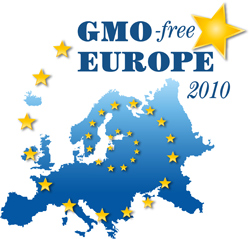
CODEX ALIMENTARIUS aprobó etiquetado de transgénicos anulando amenazas de Organización Mundial de Comercio
La Comisión del Codex Alimentarius, el órgano responsable de emitir las normas internacionales sobre la inocuidad de los alimentos, dejó a los gobiernos la potestad de decidir si etiquetan con OGM y cómo lo hacen.
Se ha decidido que "los gobiernos son libres de decidir si y cómo etiquetan alimentos derivados de la biotecnología moderna", señaló la comisión a través de un comunicado.
Sin embargo, en caso de que un país opte por el etiquetado, éste deberá ceñirse a ciertas directivas para "evitar potenciales barreras al comercio".
La presencia de organismos genéticamente modificados en los alimentos es una cuestión polémica y en varios países de la Unión Europea su cultivo está prohibido.
...
The GMO labeling fight at the Codex Alimentarius Commission: How big a victory for consumers?
On July 5, Consumers International (CI) welcomed the commission’s adoption of a text to allow voluntary labeling of GMO products. IATP likewise congratulates the commission for deciding to allow governments to inform consumers of what they are eating with less fear of WTO-authorized trade retaliation. This is no small victory for consumers. However, The Codex text did not support the mandatory labeling that CI and IATP have sought. (The final labeling text and report of the July 4–9 commission meeting have yet to be posted on the Codex web site.) Governments that choose to label genetically modified commodities or foods with GMOs will be able to justify such labeling as a risk-management tool. For example, consumers who may suffer allergic reactions to GMOs, will now have the opportunity to identify what food or foods may have triggered their reactions. Such identification may aid medical personnel to speed the recovery of food allergy patients and GMO labeling will help enable them to avoid future allergic reactions.
For the implementation of GMO labeling to avoid a WTO trade dispute over an alleged unfair trade barrier, the labeling will have to apply to both imported GMOs and domestically grown or produced GMO food products. Nevertheless, the question arises, why did the U.S. government and the agricultural biotechnology industry it has served for more than two decades decide to allow the voluntary labeling guidance to be adopted?
...
If the adoption of GMO labeling is restricted to European Union member states, which are now under huge pressure from the European Commission to end its “zero tolerance” policy for so-called “low incidence” of GMOs in nominally non-GMO imports, then the victory of the biotech industry will be sweet. Consumers will have to swallow whatever agribusiness serves up in imported commodities and food—labeling, and consumers' right to know, be damned.
1 comentario:
Estimado Presidente,
Con mucho respeto, soy apicultor, deseo decirte que lamentablemente tu blog no representa un aporte para la actividad.
Gracias
Publicar un comentario